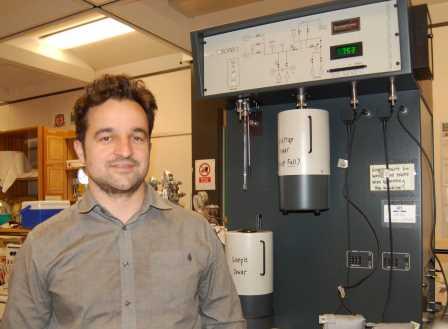Biography:
Pablo is a petrophysicist with background in geology and seven years of experience in the petroleum industry, currently a Ph.D. candidate at the University of British Columbia, researching geochemical and reservoir properties of source-rock reservoirs. He joined Chevron in 2008 after obtaining a BSc. degree in Geology at the University of Vale do Rio dos Sinos in southern Brazil. He worked as a geologist in the development of the Frade deep-water oil field, offshore Brazil for three years, while based in Rio de Janeiro. As a development geologist, he was involved in well planning, seismic interpretation, design of data acquisition programs, wellsite geology and basic well log interpretation of Oligo-Miocene unconsolidated sandstone turbidite reservoirs.
In 2011 he was recommended for a corporate-sponsored petrophysics competency development assignment at the Chevron headquarters in San Ramon, California. This two-year assignment involved attending classes developed and delivered by subject matter experts on all well log technologies and the main laboratory petrophysical measurements, as well as working on a variety of formation evaluation projects from Chevron’s portfolio around the world. He obtained his MSc. degree in Geology in 2013 on the stratigraphy and facies of the deep-water deposits of the Frade field. Upon completion of his training as a petrophysicist, he took on the position of lead petrophysicist for Chevron in Brazil, from 2013 to 2015. His responsibilities included performing log analysis for Chevron’s two development projects and exploration opportunities in Brazil, as well as co-designing and coordinating a pioneer core analysis program of an overburden shale core, in order to understand the causes of an overburden geomechanical failure and prevent future incidents. Since the fall of 2015 he is pursuing higher education in the field of source-rock reservoirs, as a Ph.D. student at the University of British Columbia, Canada.
Project: Petroleum System Analysis of the Triassic Doig Formation, Western Canada Sedimentary Basin
The objective of this project is to determine the unconventional hydrocarbon potential of the Doig Formation through a petroleum system analysis. The study will assess the volume, distribution of hydrocarbons generated and retained; the scope also includes mapping the spatial and stratigraphic variability of reservoir and source-rock properties, such as storage capacity, organic matter type and abundance, matrix permeability and elastic properties, as well as defining the geological controls on these properties. The project is divided into three inter-related sections. The first concerns the modeling of the Doig petroleum system on a basin scale with focus on thermogenic hydrocarbon generation and retention. The model will incorporate structural, lithological, geochemical and burial history data in an integrating basin modeling software platform.
The second is the evaluation of the source-rock properties of the Doig Formation and involves quantification and mapping of organic matter abundance and type, as well as maturity levels across the basin. The third section’s theme is the characterization of the reservoir potential of the Doig Formation in terms of storage capacity, producibility and response to hydraulic stimulation, by investigating and drawing relationships between lithological, geomechanical, reservoir and geochemical properties. Finding correlations between lithofacies, organic facies and reservoir facies will aid the determination of geologic controls on organic richness, petrophysical and geomechanical properties, enhancing the prediction capability for “sweet spots”. The basin model will serve as an integration platform between the pore and regional scales. It will be informed by the results from the analytical work, and it will constrain the timing of generation and migration of hydrocarbons in the Doig, as well as provide an estimate of the volume and main phase of hydrocarbon retained as opposed to expelled.
